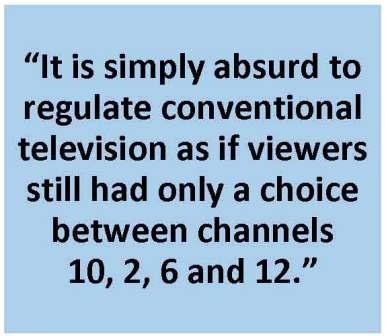
By Pierre Dion, CEO, TVA Group
WHEN IT APPEARED BEFORE the CRTC for television licence renewal hearing last week, TVA Group pointed to the changes underway in the competitive and technological environment for the broadcasting industry and explained the conditions it needs to continue to thrive in the new broadcasting landscape.
Over the years, thanks to the efforts of its 1,600-plus employees, TVA Group has become the largest French-language broadcaster of entertainment, news and public affairs programming in North America. It is also one of the largest private creators and producers of Québec cultural content. Every year, TVA Group’s programs give thousands of actors, reporters, technicians and cultural workers of all stripes a chance to showcase their creativity and talent, while contributing to Québec’s cultural and economic wealth.
To achieve and maintain this success, TVA Group has had to constantly renew itself. It has been forced to adapt to the technological tsunami that has engulfed the broadcasting industry in recent years, wreaking havoc with existing business models.
The advent of specialty channels and resulting audience fragmentation for conventional over-the-air broadcasters, the proliferation of new content delivery platforms (on TV, on mobiles, on computers and tablets), the spread of “over-the-top” services (such as Netflix, TOU.TV, YouTube and iTunes), and the growing popularity of delayed viewing via video on demand and personal video recorders are only some of the dramatic changes with which TVA Group has had to contend. We have had to respond boldly to these changes while labouring under the weight of an oppressive, obsolete regulatory system that places conventional broadcasters at a disadvantage versus specialty channels, and Canadian companies at a disadvantage versus foreign competitors, which are not burdened by the same regulations.
In view of this radically uneven playing field, TVA Group has asked the CRTC for more regulatory flexibility to help it face the new technological and competitive facts of life, while continuing to play its role as a leading player in the dissemination of Québec content.

For example, TVA Group is asking the CRTC to replace the array of terms and conditions of licence and quotas under which the TVA Network now labours by a single condition: that it allocate at least 75% of its program spending to Canadian content. While that is slightly less than the percentage the TVA Network has allocated to Canadian content over the past four years, it should not be concluded that we intend to cut back on our Québec programming.
It must be realized that Québec content has historically accounted for the bulk of the TVA Network’s schedule not because of any regulatory requirement but because of the inescapable fact that Quebecers mainly want to see programs produced in Québec, by Quebecers and for Quebecers. So it will always be in the interest of the TVA Network and its people, and in the economic and cultural interest of Quebecers, to support local content. However, we must do so within our means and within the limits created by the competitive environment.
Basically, our view is that after 50 years of success, TVA no longer needs elaborate, restrictive rules to guide its practices and to make sure it airs programs that Quebecers want to watch. In a world of unlimited entertainment offerings, it is simply absurd to regulate conventional television as if viewers still had only a choice between channels 10, 2, 6 and 12.
Even specialty channels that have been pocketing fabulous profits and have suffered none of the hardships of conventional broadcasters have joined the call for regulatory streamlining. For example, Astral Media wants to be allowed to spend only an average of 30% of combined revenues from all its pay and specialty services in all languages on Canadian content.
Simply put, we need deregulation now – and for conventional television we needed it yesterday.
Unfortunately, the CRTC has been unresponsive to the longstanding calls for less heavy-handed regulation from TVA Group, Quebecor Media and many other industry players. On the contrary, new rules are being added regularly, such as the restrictions on exclusive content introduced by the CRTC in September. It is high time that the CRTC take account of the economic and technological dynamics created by today’s global competitive environment in the broadcasting industry.
We therefore urge the CRTC to use the renewal of French-language network licences as an opportunity to move towards deregulation. The CRTC must take that path to enable Canada’s leading broadcasters to compete on a level playing field and to promote the emergence of strong players in Québec and the rest of Canada that are equipped to take on the global giants already attacking our market with substantial resources. Only in this way will we be able to preserve our cultural identity in the medium term and long term.
This is a translation in English of an Op-Ed in French published in the December 10th, 2011 issues of Le Journal de Montréal and Le Journal de Québec.
Pierre Dion, right, is president and CEO, TVA Group.


